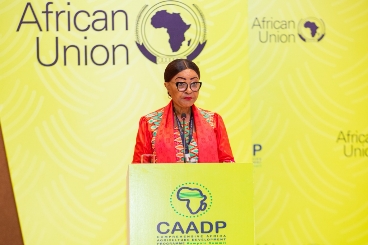The Prime Minister of Uganda, Robinah Nabbanja, has officially opened the Ministerial Session of the African Union (AU) Extraordinary Summit on the Comprehensive Africa Agriculture Development Programme (CAADP) Strategy and Action Plan for 2026–2035.
The event, held at the Speke Resort Munyonyo, brought together Ministers of Agriculture, AU officials, development partners, and representatives from regional economic communities to deliberate on the future of Africa’s agriculture.
In her opening remarks, Nabbanja expressed gratitude to the African Union Commission and its partners for their extensive efforts in drafting the post-Malabo CAADP Agenda, now named the Kampala CAADP Agenda.
She praised Uganda’s role as Chair of the AU Specialized Technical Committee on Agriculture, Rural Development, Water, and Environment (STC-ARDWE), emphasizing the country’s strategic oversight in the process.
“This session marks the culmination of over a year and a half of extensive consultations and drafting of the Comprehensive Africa Agriculture Development Programme Strategy and Action Plan 2026–2035. It is a significant milestone that highlights our collective commitment to addressing the challenges and opportunities in Africa’s agricultural sector,” Nabbanja stated.
Highlighting the continent’s vast agricultural potential, Nabbanja lamented the irony of Africa’s dependence on food imports despite its fertile soils, abundant water resources, and vast uncultivated arable land.
According to a report by the African Development Bank, over 60% of Africa’s workforce is engaged in agriculture, yet the continent imported food worth $100 billion in 2021 due to rising population growth and insufficient production.
“What a shame that a continent so richly endowed with arable land and resources remains dependent on food imports! This Summit must chart a path to reverse this undesirable trend,” she said, urging ministers to reduce Africa’s over-reliance on imported food.
Nabbanja outlined key areas for action:
- Policy Reviews: She called for updated policies to ensure food security and improved nutrition.
- Research Investment: Developing improved seeds and livestock varieties was emphasized as critical.
- Irrigation and Mechanization: Nabbanja stressed these as essential tools to combat climate change and enhance agricultural productivity.
- Regional Trade and Value Addition: The Prime Minister urged African nations to avoid trade barriers and focus on regional and continental trade opportunities, particularly leveraging the African Continental Free Trade Area (AfCFTA). She advocated for the export of value-added agricultural products such as branded coffee, cocoa, and tea instead of raw materials.
Nabbanja also underscored the importance of aligning agricultural development with Agenda 2063, Africa’s long-term blueprint for transformation. She challenged African leaders to prioritize self-reliance and ensure the implementation of the new CAADP strategy at national, regional, and continental levels.
Concluding her speech, the Prime Minister officially declared the Ministerial Session open, calling on stakeholders to collaborate effectively to realize the vision of a resilient, self-sufficient, and prosperous agricultural sector across Africa.
“For us to guarantee our future as Africans, we must feed ourselves. Let us work together, from national to continental levels, to deliver the Africa we want,” she affirmed.
The Summit is expected to adopt the Kampala Declaration and Strategy and Action Plan, setting the stage for transformative agricultural policies and practices across Africa.


